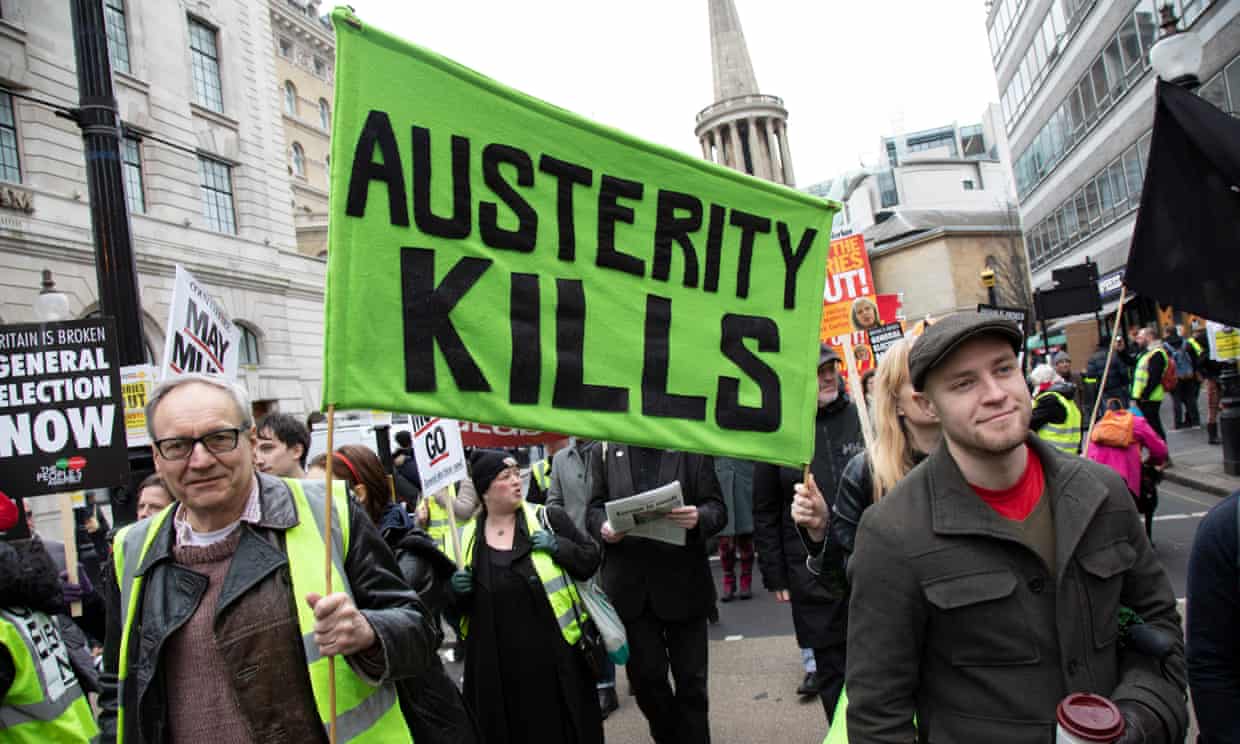Lies, damn lies and neoliberal economics and economists
"Today's neoclassical economist is an emperor with no clothes who's fooled us all long enough."

Photo: transitionvoice.com
The global application of a fraudulent economic theory, promoted and taught by its cheerleaders- the fraudulent neoliberal economists- has brought the world to its knees. Yet for those in power, it offers riches, whilst it showers its victims with misery, inhumanity, poverty, destitution and death.
Austerity is a political choice, not an economic necessity*
‘Neoliberal economists present themselves as ‘neutral’ technocrats, but they’re actually partisans for the status quo. Don’t fall for it!’ More on this a bit later.
For now, Lest We Forget
My long held struggles to make economics a force for the good
Coventry and I: The story of a boy from Iran who became a man in Coventry
To All Striking Academic Colleagues in Britain: Turn the Strike to a Force for the Common Good
Today, with total humility and selflessness, in a moment of soul searching and reflection, I feel peace and contentment. I feel at ease with myself, that, the very costly and personal price that I paid for my belief and conviction, that modern neoliberal economics is nothing but a fraudulent mumbo-jumbo, was all worth it. I was right. I am proven right. I hold my head high and my conscience is clear. I did not cheat my students, and I did not lie to them. I am grateful for this for the rest of my days.
The Broken Economic Model and the Inhumanity of the Lost Decade of Austerity
People’s Tragedy: Neoliberal Legacy of Thatcher and Reagan
The Destruction of our World and the lies of Milton Friedman
These are the main ingredients of the Bastard Economics of Neoliberal Ideology
Oxford Theology Society Lecture: Values to Make the World Great Again
Calling all academic economists: What are you teaching your students?
And now, reverting to the main theme of this Blog: ‘Neoliberal economists present themselves as ‘neutral’ technocrats, but they’re actually partisans for the status quo. Don’t fall for it!’
Austerity is a political choice, not an economic necessity*

‘Neoliberal rhetoric always disguises the coercion underlying austerity’ Photo: The Guardian
‘The outcome of austerity policies in Britain and elsewhere has become painfully clear: increased child poverty and social misery; declining life expectancy; an increase in racial inequality; decaying public schools and public health and other public services; and all-around catastrophe for disabled people.
Yet the Financial Times columnist Martin Wolf recently recommended the book Austerity: When it Works and When it Doesn’t as his top book to read this summer. The book is a qualified defense of austerity policies written by Alberto Alesina, Carlo Favero, and Francesco Giavazzi, an influential trio of economists and rising stars known for advising major economic institutions. “This is an extremely important book,” Wolf said. The economist Kenneth Rogoff agreed, recently describing Austerity as “a towering scholarly achievement.”
We agree with Wolff that this is an extremely important book but not because of its scholarly achievements as Rogoff claims, but rather because of its ideological character that serves to unabashedly justify oppressive neoliberal policies that are still being implemented worldwide.
Alesina and his co-authors attempt to save austerity from its demise by positing an empirical distinction between two types of austerity. One, based on tax increases, hurts the economy they say, while the other, based on spending cuts, has less recessionary effects and can even expand the economy. By putting forth this distinction, the authors end up defending the harmful economic policies occurring in most Western countries, including the US: aggressive cuts to taxes (especially to corporate taxes) and to public welfare expenditure.
In other words, this book – and its public acclamation in the mainstream media - is a telling example of the way in which neoliberal economic discourse is rendered technical and seemingly “depoliticized” in order to justify coercive state policies in favor of the one percent.
Through technical language and appeals to science and expertise, neoliberal economic prescriptions are presented as “natural givens” that society must accept as matters of fact. Economists can therefore claim to be neutral scientific commentators rather than ideologues of the status quo – and technocrats can treat those economists’ prescriptions as indisputable and inevitable.
Economic Growth: The Index of Misery
Britain today and the Bankruptcy of Ideas, Vision and Values-less Education
Recession, Austerity, Mental, Emotional and Physical Illness
This is most visible in the book’s emphasis on economic growth and its tendency to ignore class differences in favor of a vaguely defined general or national interest. For economic experts like Alesina, Favero and Giavazzi, the sole criterion that matters seems to be the effect of austerity on GDP. Their preference for this metric is a reminder of just how out of touch they are with the real-life needs of most citizens.
This preoccupation with GDP growth fails to ask an important question: for whom, exactly, is GDP growth beneficial? There is no automatic correlation between GDP growth and prosperity for everyone. According to the standard neoliberal argument, cutting welfare expenditure lowers taxes and increases the pool of wealth available for private investment. This line of thinking is based on the strange assumption that the interests of the top one percent and the interests of the nation as a whole are the same, and that the rest of us should stomach harsh cuts to social spending while waiting for wealth to spread to ordinary people.
Neoliberal rhetoric always disguises the coercion underlying austerity - a policy agenda to enhance capitalist growth while reallocating the burden of capitalism’s failures to the majority of the population. This requires the subordination of the working people by rising unemployment, forcing wage cuts, cutting welfare expenditures, eroding social solidarities, demonizing immigrants, tearing apart communities and ultimately increasing levels of exploitation.
We must never forget that the fundamental question is not “when does austerity work and when doesn’t it?” but “for whom does austerity work, and for whom doesn’t it?”
*This article by Clara Mattei and Sam Salour was first published in The Guardian on 2 September 2019.
...And now read about the possible paths on how we may put right what has so tragically gone wrong, on how to stop death and destruction and how we may begin to value and nurture life again
I am positive and hopeful. We can change the world for the better. Come with me on this journey of self discovery in the interest of the common good
Yes, We can win over death and destruction, the neoliberalism, If we listen to the Voice of Hope, echoing across the world,
The Voice of Hope
"The Days to Come"
Now shall I store my soul with silent beauty,
Beauty of drifting clouds and mountain heights,
Beauty of sun-splashed hills and shadowed forests,
Beauty of dawn and dusk and star-swept nights.
Now shall I fill my heart with quiet music,
Song of the wind across the pine-clad hill,
Song of the rain and, fairer than all music,
Call of the thrush when twilight woods are still.
So shall the days to come be filled with beauty,
Bright with the promise caught from eastern skies;
So shall I see the stars when night is darkest,
Still hear the thrush’s song when music dies.
~ Medora C. Addison, “The Days to Come,” in Dreams and A Sword (Yale University Press, 1922).

The lackluster economy, continuous and deepening global crisis since the crash of 2008 and much much more are delivering a humbling lesson about economics: Values-less theories and models, laced with large doses of incomprehensible mathematical mumbo-jumbo, resulting in top-line growth, doesn’t ensure either bottom-line prosperity nor ethical/moral/spiritual behaviour or a good life.
Yet, the practice of conventional economics remains focused solely on the former while the latter is deemed someone else’s responsibility, which has resulted in socialism (with all the benefits) for the 1% and capitalism (with all the costs and consequences) for the rest!
However, now, years of soul-searching have spawned movements that could change fundamental aspects of the field, from the way it is taught to people who practice it and the underlying theories it treats as gospel. This GCGI Common Good Project- Remaking Economics- examines the foundations of a revolution with far-reaching consequences for our understanding of the world, our lives and ultimate wellbeing.
Below, you will find a sample of my take on ‘Remaking Economics’:
Remaking Economics in an age of economic soul-searching
The World would be a Better Place if Economists had Read This Book
In Praise of Darwin Debunking the Self-seeking Economic Man
Composing a New Life: In Praise of Wisdom
Brexit, Trump and the failure of our universities to pursue wisdom
Calling all academic economists: What are you teaching your students?
The Journey to Sophia: Education for Wisdom
My Economics and Business Educators’ Oath: My Promise to My Students
What might an Economy for the Common Good look like?
Christmas and New Year Message Holds True: A Time to Weave a New and Hopeful Tapestry of Life
What if Universities Taught KINDNESS?
Wouldn’t the world be a better place with a bit more kindness? Harnessing the Economics of Kindness
Today is World Kindness Day: Embracing Kindness to Defeat the Political Economy of Hatred
